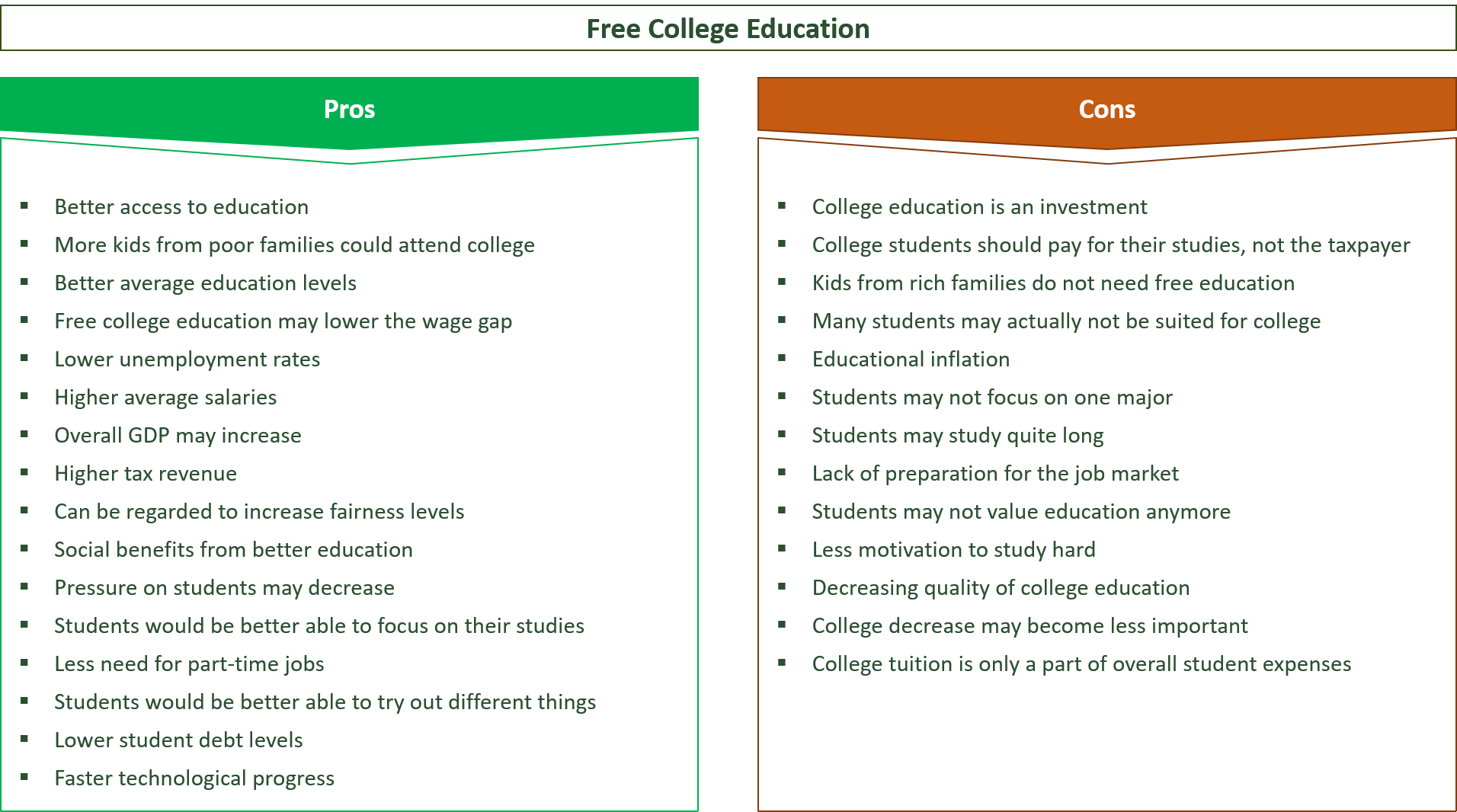“I think the colleges should be free to give athletes less than a full scholarship, no scholarship and more than a scholarship. And the athletes should be free to bargain.”
Taylor Branch, Author
Advantages & Disadvantages of Free College

There is an ongoing discussion about whether college should be free or not in many countries all over the world.
While there are many advantages related to free college education, there are also some problems related to it.
In this article, the pros and cons of free college education are examined in detail.
Audio Lesson
Contents
Advantages of Free College Education
- Better access to education
- More kids from poor families could attend college
- Better average education levels
- Free college education may lower the wage gap
- Lower unemployment rates
- Higher average salaries
- Overall GDP may increase
- Higher tax revenue
- Can be regarded to increase fairness levels
- Social benefits from better education
- Pressure on students may decrease
- Students would be better able to focus on their studies
- Less need for part-time jobs
- Students would be better able to try out different things
- Lower student debt levels
- Faster technological progress
- Diversity in colleges would increase
- Preparation for the future
Better access to education
One important benefit of free college education is that it improves access to education for everyone of us.
While with high tuition fees, there is a huge barrier to entry regarding college education, there are plenty of opportunities for the general public to get college education if they do no longer have to pay for it.
Education is important in all parts of our daily life and better access to education for the general public can be regarded to be a quite good thing in order to improve our overall chances in life.
More kids from poor families could attend college
Free college education is especially important for kids who come from rather poor families and who would never be able to afford college education if there were high tuition fees.
Hence, for children from poor families, free college education would be a real blessing since they would now be able to get good college education without having to pay large sums of money for it.
In turn, it would become more likely that children from poor families would be able to get out of poverty since education and financial wealth are strongly correlated.
Better average education levels
Through free college education, also the average education levels of the general public would likely improve significantly.
Such an improvement in education would benefit people in many different ways.
For instance, if people have a better financial education, they are more likely to make better investment decisions, which in turn results in higher levels of wealth in the long run.
Free college education may lower the wage gap
There is still a huge wage gap between skilled and unskilled workers in many countries all over the world.
This income gaps will trap many low-wage workers in poverty.
However, if those workers are able to get better education since college becomes free, chances are that more of those workers might be able to quit their shitty job and to get a high-salary job instead.
Therefore, better education due to free college education may also provide the opportunity for many people to get out of quite poor working conditions and to increase their wealth levels over time.
Lower unemployment rates
Higher education levels may also result in significantly lower unemployment rates.
Quite often, unskilled workers are at a far higher risk of becoming unemployed sooner or later.
Moreover, those unskilled workers may also have a quite hard time to find a new job once they become unemployed.
However, through access to free higher education, more of them could improve their education levels and therefore also improve their chances to find a new job.
Higher average salaries
College graduates also earn significantly more money over the course of their lives compared to people without higher education.
This also implies that with free college education, more people would take the opportunity to attend college and the average wage levels would likely increase due to that.
This is due to the fact that with better education, people become more productive and can earn more money for the company.
In turn, the company is willing to pay higher wages for those workers.
Overall GDP may increase
With higher average wages and higher productivity of companies due to better education levels of workers, also the overall GDP in the respective country would likely increase significantly.
This means that more goods and services can be produced per person on average, which often also results in higher average wealth levels of the general public.
Higher tax revenue
Since people earn more money and companies make higher profits due to free university education, governments will also be able to earn higher tax revenues.
In turn, governments in those countries can invest more money in research and development in order to strengthen the market position of companies in global competition.
Moreover, this increased tax revenue could also be used to improve the overall infrastructure in order to assure higher living standards for the general public.
Can be regarded to increase fairness levels
Advocates of free college often also claim that free college education can increase the overall level of fairness in our society.
Education should not greatly depend on the income and the wealth of families, but rather on the will of people to study and work hard.
Therefore, also from a fairness perspective, free college education should be considered in order to give more people the opportunity to acquire higher education.
Social benefits from better education
Many studies have shown that the level of education is also strongly correlated with how well people are doing in social interactions and in building connections.
Hence, people with higher education levels may be better able to build business connections and to behave in a kind manner with other people compared to people with low education levels.
Moreover, since the average wage gap might decrease due to free education, also the social tensions that are related to income gaps would be decreased.
This implies that if we want to improve our social coherence, we should foster free college education.
Pressure on students may decrease
Due to high tuition fees, students often feel quite a lot of pressure on their shoulders to perform well in college since they know that their parents will pay a lot of money and they urgently want to pay them back for that with good grades.
However, for some students, this pressure will become too much and they might start to suffer from mental issues like depression.
This is especially true for students who are not able to perform well.
Thus, by abandoning tuition fees, we could take away some of the pressure on students, which may translate into a higher quality of life for them and also lowers the risk for mental problems.
Students would be better able to focus on their studies
Without tuition fees, college students would also be better able to focus on their studies since they do have to worry less about how to finance their studies.
In turn, the performance of students would likely improve.
Less need for part-time jobs
Another upside of free college education is that fewer students would need a part-time job to finance their studies.
Although it is not bad to get a first impression of how the work life looks like, part-time jobs also take away plenty of time that may be needed for students to learn and to prepare for exams.
Thus, without tuition fees, students would be better able to focus on their studies instead of having to work at jobs to finance their education.
Students would be better able to try out different things
With free college education, students would also be able to try out many different things since they would not feel the financial pressure that comes along with high tuition.
Therefore, they may be far more likely to figure out what they are really interested in and can go in this direction instead of focusing on just one major at the beginning.
Hence, free college also gives students plenty of opportunities to try out different subjects in order to figure out what they really want to do with their life.
Lower student debt levels
In general, with free college education, students would also not have to suffer from the financial burden which comes along with high amounts of student debt.
Student debt is one of the worst forms of debt since it often implies high interest rates and has also some other additional downsides.
Therefore, by relieving students from this debt, they might have a much easier start for their future life since they can use their money for other important things, for example to buy a home.
Faster technological progress
Another advantage of free college is that technological progress would likely speed up.
If more people get a college degree and the overall education levels increase, also the chance that more people invent new things increases.
In turn, we as a society could profit from those new inventions and our overall quality of life may improve significantly in the long run due to these technological inventions.
Diversity in colleges would increase
If more people are able to attend college due to free tuition, also the level of diversity would increase significantly.
In our current state of the world, minorities often earn lower wages and are therefore often not able to afford college for their kids.
However, if the tuition barrier is removed, also the kids that belong to minorities would now be able to go to college.
In turn, the multicultural experience in college would improve, which would broaden the horizon of all students on campus.
Preparation for the future
College is still an important entry ticket to well-paying jobs.
Many companies still require college degrees if you want to have a leadership role in those firms.
With a good job, it is easier to provide for your family and so on.
Thus, college can be regarded to be one of the most important measures to prepare yourself for your future life.
Therefore, with free college education, more people would be able to get a college degree and their overall chances in their future life might significantly improve.

Disadvantages of Free University Education
- College education is an investment
- College students should pay for their studies, not the taxpayer
- Kids from rich families do not need free education
- Many students may actually not be suited for college
- Educational inflation
- Students may not focus on one major
- Students may study quite long
- Lack of preparation for the job market
- Students may not value education anymore
- Less motivation to study hard
- Decreasing quality of college education
- College decrease may become less important
- College tuition is only a part of overall student expenses
College education is an investment
From the previous argumentation, it has become clear that there are many arguments for free college education.
However, there are also some problems related to free college.
For instance, opponents of free education claim that college should be considered to be an important investment in one’s life and that it offers much better future job opportunities.
In turn, people who want to attend college should pay for this opportunity since they also vastly profit from their college degree afterward.
College students should pay for their studies, not the taxpayer
Another disadvantage of free college education is that the money for this kind of education has to come from somewhere.
In the end, if college students will no longer pay for their education, the taxpayer will pay the piper.
Hence, it might not be considered fair to burden the costs of college education on taxpayers since they do not profit too much from the education of strangers.
Therefore, it is rather questionable whether it is fair to impose the high costs for college on taxpayers instead of on college students who directly profit from their degree.
Kids from rich families do not need free education
There is also the issue that with free college education, also the kids from rich families who actually would be easily able to pay for college tuition would no longer be forced to pay for their college education.
Thus, free education might also benefit many people who do not actually need any financial support to send their kids to college.
Many students may actually not be suited for college
Especially over the past years, the number of students that applied for college increased dramatically.
While going to college was meant for a small number of people a few decades ago, it now becomes kind of a mass movement to attend university.
However, there are many people that might actually not be suitable for college since it does not provide them the education that they would expect.
For instance, some people might be far more suited and happier to work in a craftsmen job instead of attending college.
Educational inflation
With free college education, chances are that there would be a run on colleges.
In turn, those education institutions would have a rather hard time to provide those huge numbers of students with proper education due to organizational problems.
Moreover, if too many people attend college, the degree of each individual becomes less valuable. The same is true for the job opportunities for college graduates.
If there are too many graduates, there will be higher unemployment rates since not all graduates may be needed in the local job market.
Students may not focus on one major
Even though free college education gives students the opportunity to try many different subjects, it also implies the risk that college students do not focus their efforts on one major.
This may result in problems since if those students take part in too many different majors and classes, chances are that the grades will significantly suffer in each course and many students may leave college without a degree due to that.
Students may study quite long
Since students may try out many subjects, the average time a student needs to complete his degree might also significantly increase.
This may lead to financial issues for students since they may take a longer time to earn their own money.
Moreover, it might also hurt the local economy since firms have to wait longer until they can employ college graduates.
Lack of preparation for the job market
Since students are basically free to try and choose different subjects in university since there are no extra tuition fees associated with them, they would also be more likely to study subjects that they might like but which do not provide good job opportunities at all.
Thus, even though the time on campus may be quite pleasant, there might be an unpleasant surprise for those students later on in their life when they will have a quite hard time finding a job.
Students may not value education anymore
It is in human nature to be skeptic about free stuff.
For instance, you might have noticed that you value things that cost significant amounts of money more compared to things that are given to you for free.
The same can be true for education. If students take it for granted that they will get all the education for free, chances are that they might not value this kind of education the way they are supposed to value it.
Less motivation to study hard
If students do not value their free education, also the chances that they become less motivated increases dramatically.
Imagine you are a college student and you know that your parents spend large sums of money for your tuition.
Chances are that you will be quite eager to study hard to pay them back sooner or later.
However, if there are no tuition fees, chances are that you are more relaxed and do not have too much motivation to study hard since you know the financial burden on you and your family is rather limited.
Decreasing quality of college education
If too many students attend college due to the abandoning of tuition fees, chances are that also the overall education quality will suffer.
For example, if there are too many students on campus and classes are quite crowded, chances are that teachers will not be able to answer all of the questions properly.
Moreover, also the preparation for exams and the learning experience may suffer significantly since there might be not enough books in the library or not enough quiet spaces to study on campus.
College decrease may become less important
There has also been a trend in the recent past that college degrees have started to become less important.
Some big companies now also employ people for leading positions who do not have a college degree.
Thus, if this trend continues in the future, chances are that attending a college would not necessarily give you an advantage in the job market anymore.
Therefore, instead of providing free college education, governments may want to spend the money on other sorts of education that may better prepare people for the local job market.
College tuition is only a part of overall student expenses
Even if there is free college education, it doesn’t mean that everyone can attend college.
Apart from those tuition fees, there are several other costs related to attending college.
Housing can be a significant cost factor and there are many other additional costs that come along with going to college.
Thus, poor families may still not be able to send their kids to college, even if the education itself would be free.

Top 10 Free College Pros & Cons – Summary List
| Free College Pros | Free College Cons |
|---|---|
| Higher overall education level | College education as an investment |
| Lower unemployment rates | Those who profit should pay for it |
| Higher average salaries | Higher burden on taypayers |
| Also kids from poor families can go to college | Educational inflation |
| Increase in overall GDP | Longer studying periods |
| Higher level of technological progress | Students may not value their education |
| Higher tax revenue | Less motivation to study hard |
| Lower financial pressure on students | College may become less important in the future |
| Social benefits of education | Not everyone is suited for college |
| Diversity would increase | Overall education quality in colleges may decrease |
Should College Education be Free?
As we have seen before, there are several pros and cons related to free college education.
In the end, it depends on the preferences of the general public whether college should be free or not.
However, an interesting alternative to free college education would be to lower interest rates and to extend the time for repayment for those loans so that they will not have a too high financial burden once they graduated from college.
Through this measure, the ones who profit the most from their degree (students) would still bear the costs of this education, while they would be more flexible regarding the repayment of their loans at the same time.
Sources
https://en.wikipedia.org/wiki/College
https://en.wikipedia.org/wiki/University
https://en.wikipedia.org/wiki/Higher_education
https://www.usnews.com/best-colleges
https://www.britannica.com/topic/college-education

About the author
My name is Andreas and my mission is to educate people of all ages about our environmental problems and how everyone can make a contribution to mitigate these issues.
As I went to university and got my Master’s degree in Economics, I did plenty of research in the field of Development Economics.
After finishing university, I traveled around the world. From this time on, I wanted to make a contribution to ensure a livable future for the next generations in every part of our beautiful planet.
Wanna make a contribution to save our environment? Share it!
